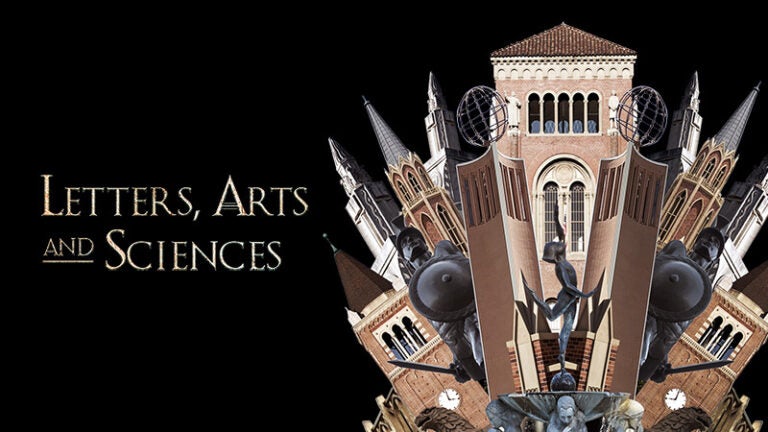
7 ways a liberal arts degree can help win the “Game of Thrones”
Though it’s spring in Los Angeles, winter has finally arrived in Westeros.
This April, Game of Thrones fans will finally get to experience the series’ conclusion. As Daenerys Targaryen, Jon Snow and Cersei Lannister vie to rule the Seven Kingdoms, they — and anyone else who might join the fray — would be well-equipped not only with an army at their backs but with a solid foundation in history, international relations, religion and other liberal arts fundamentals.
Faculty experts at USC Dornsife College of Letters, Arts and Sciences explain how mastery of seven liberal arts disciplines would serve the future ruler of Westeros well in her or his quest to win — and hold — the Iron Throne.
1. History
The competitors in the series would be well-served to look to the past as they make decisions for the future, says Lindsay O’Neill, assistant professor (teaching) of history.
“Studying history offers a road map for how societies function,” she said. “It reveals how power is structured, how change happens and how knowledge is formed. They can step back and evaluate how processes worked in the past and then use them to chart the future.”
2. Religion
Throughout Westeros and beyond, religion is a vital part of daily life. Understanding and respecting each religion would serve our competing rulers well as they vie for the throne, explains Lisa Bitel, Dean’s Professor of Religion and professor of religion and history.
“We see the competition of new and old religions, and the ways that people use their religious identification for both personal advancement and the greater good.”
And much like in real life, religions are tangled with politics and power, she says. “Scholars of religion learn to spot the continuing influence of religions across the centuries in the operation of politics, the economy, social structure and culture.”
3. Languages
Being able to deftly switch from the common tongue to Valyrian or Dothraki has served Daenerys well on many occasions whether it was holding court in different regions or in her business dealings.
Sarah Portnoy, associate professor (teaching) of Spanish, who teaches Spanish language and Latino food culture, says that studying different languages is beneficial because it opens up new worlds for speakers.
“Knowing a language is a window into a different culture — its traditions, its food culture and so much more. It allows you to engage with people from backgrounds that are different from your own and learn to respect their culture,” she said.
4. Earth sciences
Winter in Westeros is nothing to laugh off, so much so that it’s House Stark’s foreboding — and oft repeated — motto. It can last for years or, in one case, a generation.
The potential leaders of the Seven Kingdoms would be wise to learn more about the atmospheric patterns and geology of their world, says climate scientist Julien Emile-Geay, associate professor of Earth sciences.
“In the show, seasons are so consequential to every aspect of life, including invasions by White Walkers. ‘Winter is coming,’ yes, but how soon and how harsh? Imagine what Westerosi rulers could do if they had an adequate climate prediction system,” he said.
“Also, since the only proven weapon to combat White Walkers — besides dragons and Valyrian steel — is dragonglass (also called obsidian, an amorphous volcanic rock), these rulers and their maesters would do well to draft a geological map of Westeros to see if volcanic deposits other than Dragonstone could help fend off their frigid foes.”
5. Literature
What happens when the frightening bedtime stories you heard as a child turn out to be true? White Walkers were once relegated to fairytales until it was revealed those stories were actually histories.
Narratives we pass down over generations give us a place to manage the things that frighten us, explains Leo Braudy, University Professor and professor of English, art history and history, who studies people’s fascinations with monsters.
“We tell stories about the things that scare us most so that, instead of hiding under the bed or jumping out of the closet, our monsters can be part of something with a beginning, middle and end, and we can own them.”
6. International relations
International relations can help leaders to understand, among other things, the psychological profiles of their allies and adversaries, imperatives from domestic politics and constraints imposed by the international system, says Patrick James, Dean’s Professor of International Relations.
James teaches the fundamentals of international relations at USC Dornsife through the lens of fantasy narratives.
“International relations theories bring these factors together in a highly integrated way that can provide the basis for more effective creation and implementation of policy,” he said.
7. Archaeology
If you want to know how the kings and queens of the past built kingdoms that expanded and endured, you should talk to archaeologists, says Lynn Dodd, associate professor of the practice of religion and director of USC Dornsife’s Interdisciplinary Archaeology program.
“Kings say all sorts of things in their histories and on their monuments, but archaeologists look at the traces left behind, which often tell a very different story,” says Dodd, who teaches a course on ancient ways of living.